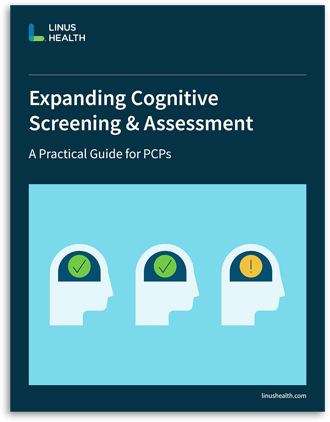Practical solutions for proactive brain health®
Leveraging cutting-edge neuroscience, clinical expertise, and AI to accelerate early detection of Alzheimer's and other dementias.

Bringing the power of digital health to brain health
Amid the global aging of the population and startling projections for Alzheimer's and other dementias, it’s never been more critical to find new ways to detect and address cognitive issues early. At Linus Health, we aim to help people live longer, happier, and healthier lives with better brain health. That starts with empowering providers and researchers with better tools for assessing cognitive function.
A groundbreaking digital platform for early detection
We're on a mission to make early detection of cognitive impairment more widespread in brain health. That requires making it both possible and practical. To that end, our AI-enhanced digital cognitive assessment platform enables sensitive and efficient cognitive testing for both providers and researchers.
For healthcare delivery organizations, our platform combines next-generation digital cognitive assessments, actionable clinical decision support, and personalized patient plans to help providers find and act on cognitive issues early.
For life sciences companies and other research organizations, the platform provides sensitive digital cognitive assessments, timely data access, and modern administrator and participant tools to streamline cognitive research.
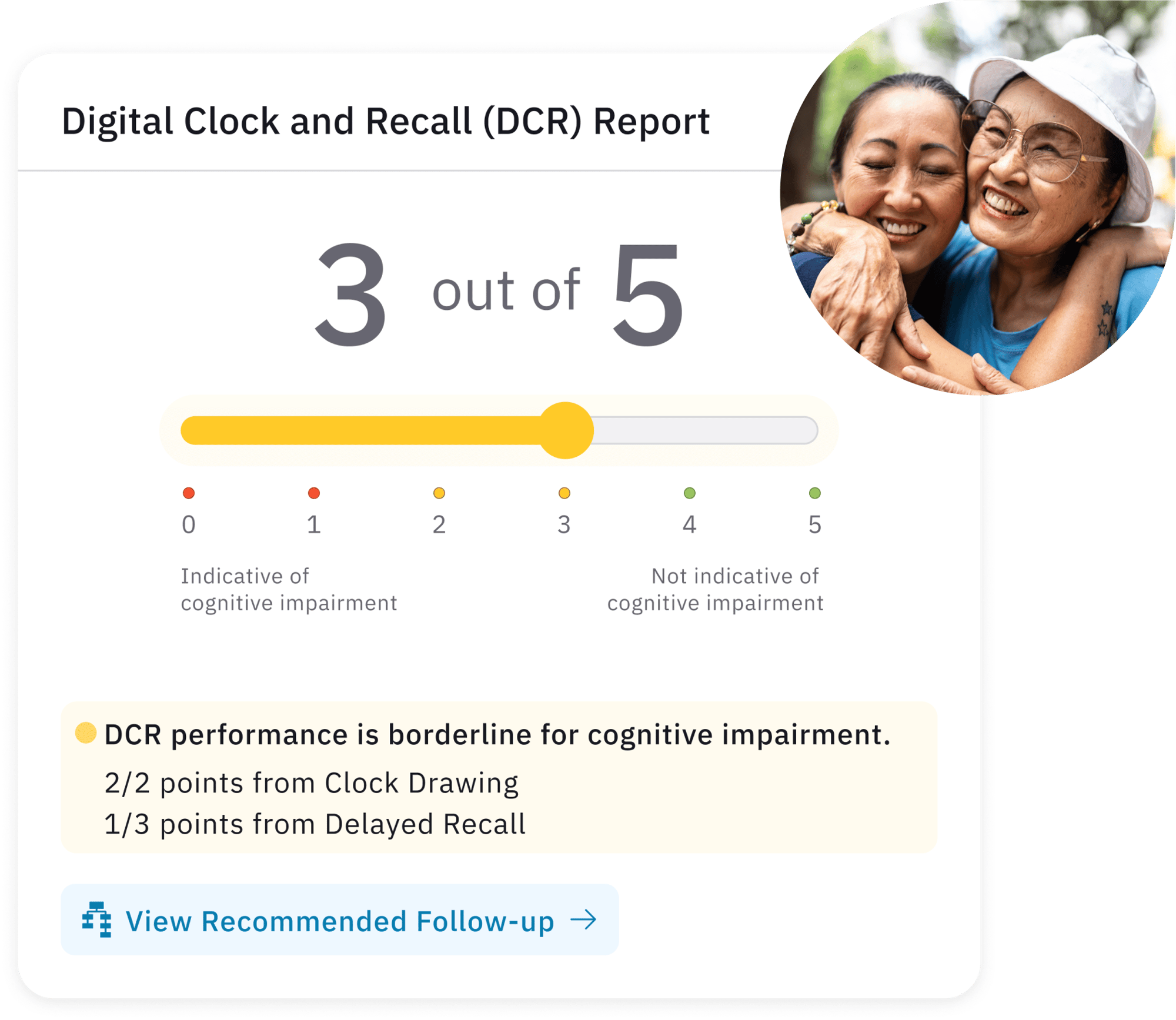
A digital upgrade to a long-established standard
Our flagship assessment, DCTclock™, is a scientifically-validated digital upgrade to the long-established pen-and-paper Clock Drawing Test. Named to TIME’s Best Inventions of 2021 list, DCTclock surfaces subtle signs of cognitive impairment that could otherwise go undetected for years, while enhancing assessment objectivity and efficiency. Now fully administered via iPad, earlier versions of the product arose from over a decade of R&D at Lahey Hospital & Medical Center and MIT.
Our next-generation digital cognitive assessment, Digital Clock and Recall (DCR™), incorporates and builds on DCTclock by adding immediate and delayed word recall elements to assess verbal memory, a key indicator of a person's cognitive trajectory.
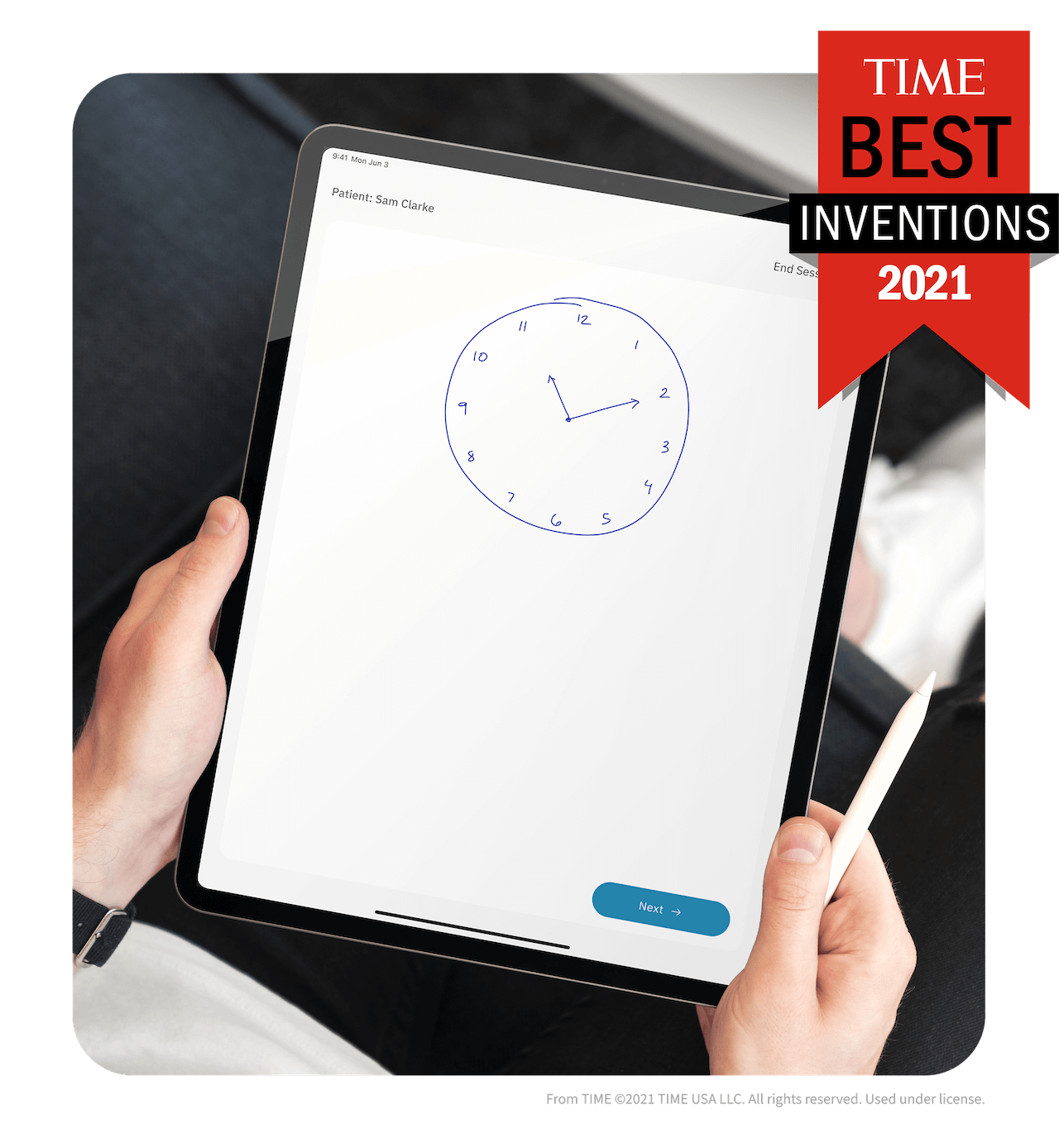
Clinical expertise combined with cutting-edge AI
At Linus Health, we focus on augmenting human clinical expertise with AI, unlocking new visibility into cognitive function for clinicians and researchers. The key to what makes our assessments unique? Incorporating the Boston Process Approach. This approach – exclusive to Linus Health in the context of digital clock drawing tests – suggests that analyzing a person's process as well as errors, provides much more insight about cognition than test outputs alone. DCTclock™ utilizes this approach to assess 100+ metrics in the clock drawing process, yielding greater insights and sensitivity in the detection of cognitive impairment.
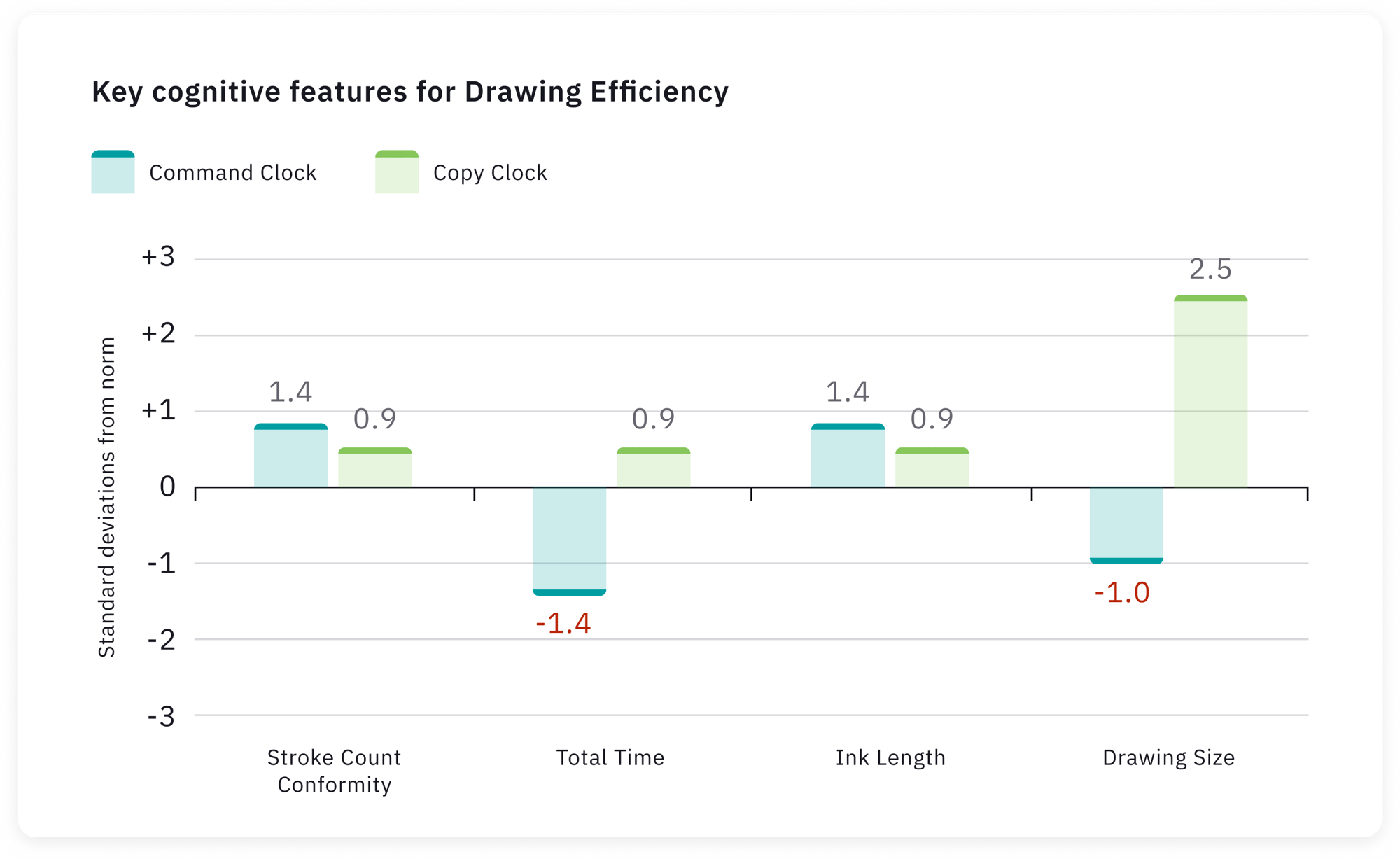
Grounded in science
Science is at the core of everything we do. Our solutions have been the focus of over a dozen peer-reviewed, scientific publications – validating their ability to outperform long-established cognitive tests in detecting early signs of cognitive impairment.

Core Cognitive Evaluation™
While 98% of PCPs in an Alzheimer’s Association survey said it’s important to diagnose mild cognitive impairment (MCI), almost 60% said it’s difficult to do so. The top-reported challenges include difficulty distinguishing MCI from normal aging (72%), difficulty interpreting patient reports of daily functioning (51%), and lack of expertise in performing cognitive assessments (47%). That’s why the Linus Health platform for healthcare delivery organizations provides much more than scores.
Core Cognitive Evaluation™ combines quantitative insights from our next-generation digital assessment with qualitative insights from a life and health survey, helping providers understand both a patient’s current cognitive status and future dementia risk. To make these insights actionable, the software platform provides clinical decision support alongside patient results and generates personalized action plans for patients - making it easier for providers to navigate next steps and support patients with evidence-based guidance.
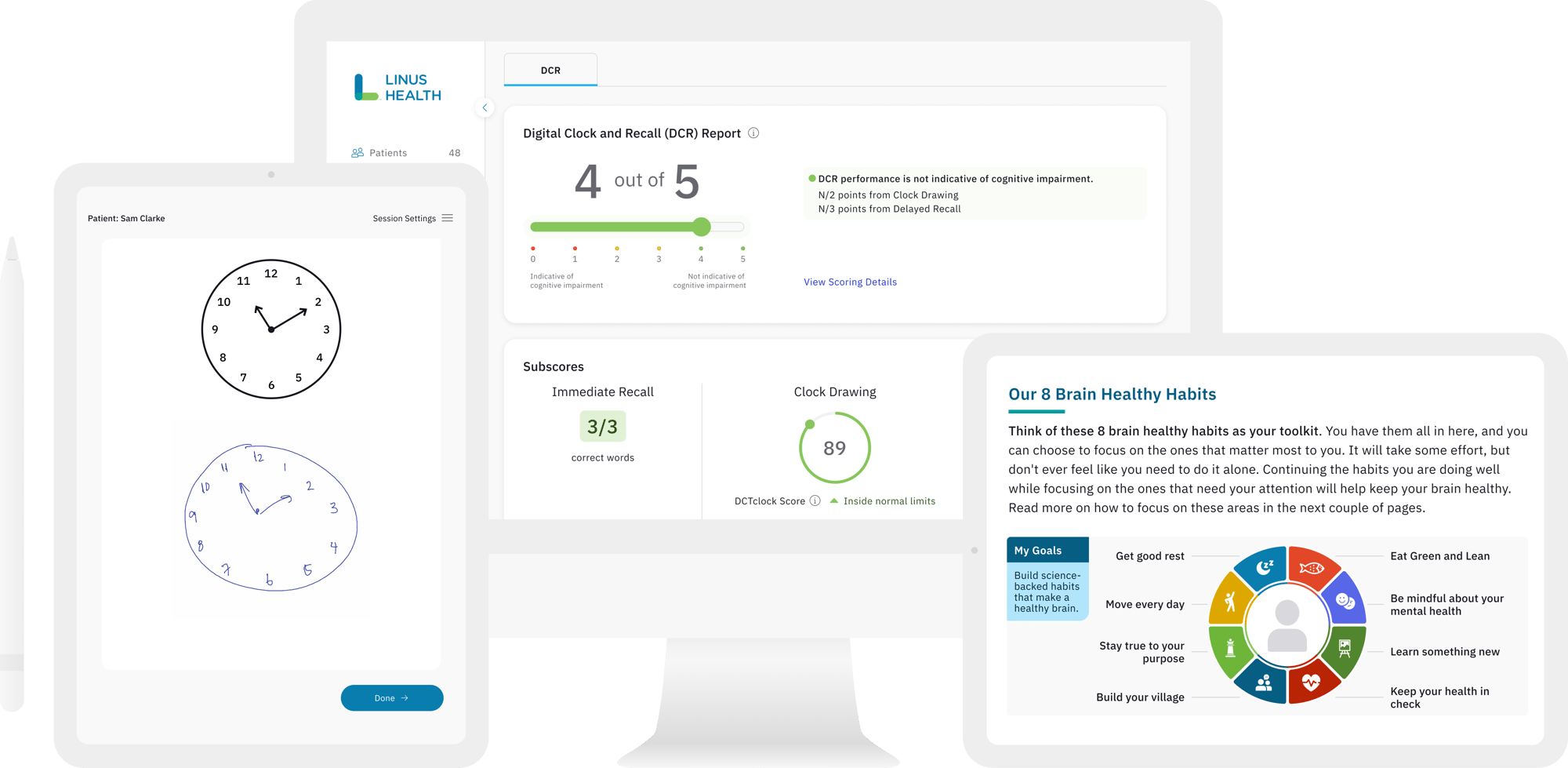
A partnership, not just a product
The strength of any solution hinges on the team behind it – especially in healthcare. At Linus Health, everything we do is grounded in science, clinical expertise, and a deep understanding of customer needs. We bring together experts in neuroscience, clinical care, artificial intelligence, data science, and product innovation to deliver cutting-edge solutions and further our work to transform brain health worldwide.
What's more, our team is committed to delivering both an exceptional product and exceptional service – from day one. We know that adopting any new technology requires a solid understanding of how it will fit into – and enhance – existing workflows and we work closely with our customers to plan for a successful rollout. Our customer success team not only facilitates an efficient implementation, but also partners with customers on an ongoing basis to help them achieve their objectives.

Compliance and trust
The Linus Health platform upholds the highest standards of regulatory and compliance excellence. Our commitment safeguards patient data integrity, supports organizational accountability, and enables trusted clinical and research use across global health systems. Linus Health is registered with the FDA, MHRA, and Health Canada, ensuring that every workflow and assessment meets international medical device standards.
Frequently asked questions about neurocognitive tests
Below you'll find answers to the most common questions about cognitive testing.
What advantages does a digital cognitive assessment offer over paper-based tests?
Digital cognitive assessments offer a wide range of benefits relative to traditionally paper-based predecessors. For example, digital cognitive testing tools boost workflow efficiency with automated administration. They also enable objectivity and consistency in testing and some have been proven to have higher sensitivity than traditional tests. For more comparison insights, visit our page on advancing cognitive testing.
What are the benefits of using a digital health platform for cognitive testing?
In addition to the benefits digital cognitive tests themselves offer, a broader digital health platform can deliver a range of additional value to providers. For example, the Linus Health digital platform also includes integrated clinical guidance to support next steps based on cognitive assessment results. It also generates personalized brain health action plans to help patients take lifestyle and health-based steps to promote overall brain health.
How do providers incorporate digital brain health technology into their practices?
Digital solutions for cognitive screening and assessment can help providers enhance care while streamlining clinical workflows. Providers and other practice leaders should start by establishing their goals for implementing digital brain health technology and what the associated practice workflows will look like. From there, establishing evaluation criteria for potential solutions and identifying individuals who will be involved in the process is a key next step. For more, download our guide.
How does digital brain health technology use artificial intelligence?
Linus Health’s digital cognitive assessments incorporate AI to derive dozens of insights from a person’s process of completing cognitive tests (e.g., drawing a clock), along with the final product (the clock). This process-based analysis in neuropsychological testing is known as the Boston Process Approach and unique to Linus Health.
How can people protect their brain health as they age?
While there is no cure currently for Alzheimer’s disease, encouragingly, there is a growing body of evidence that supports the positive impact that life and health-based interventions can have on protecting and improving cognitive health. These include interventions designed to address modifiable risk factors, such as exercise, smoking, and hypertension. Read our white paper for providers to gain more insights on these and other modifiable risk factors.
Prepare for shifting dynamics in cognitive care
Download the guide below for insights on preparing for older adults' evolving brain health needs.
